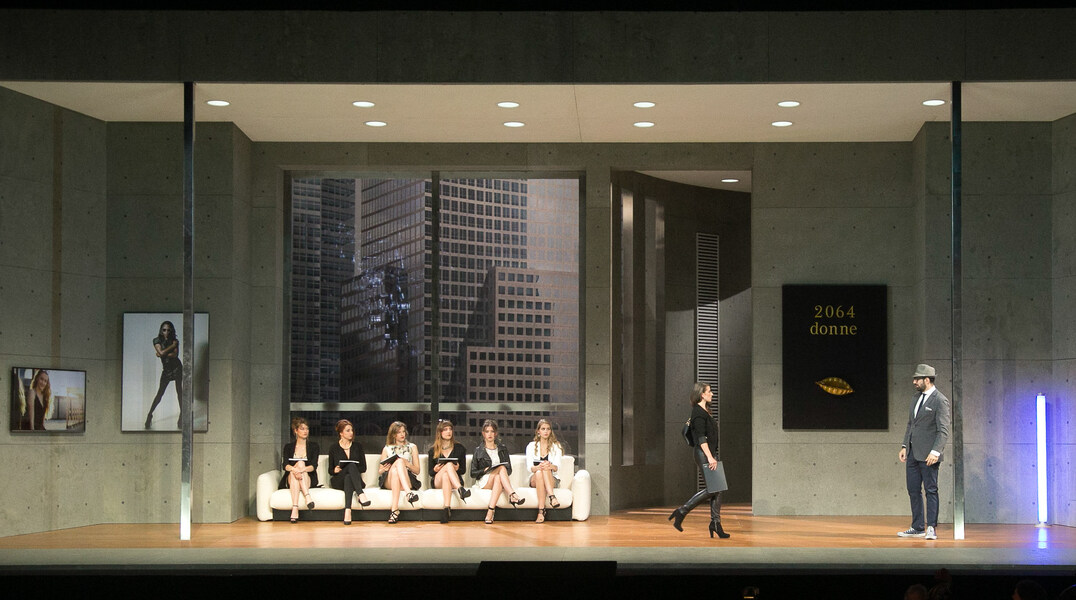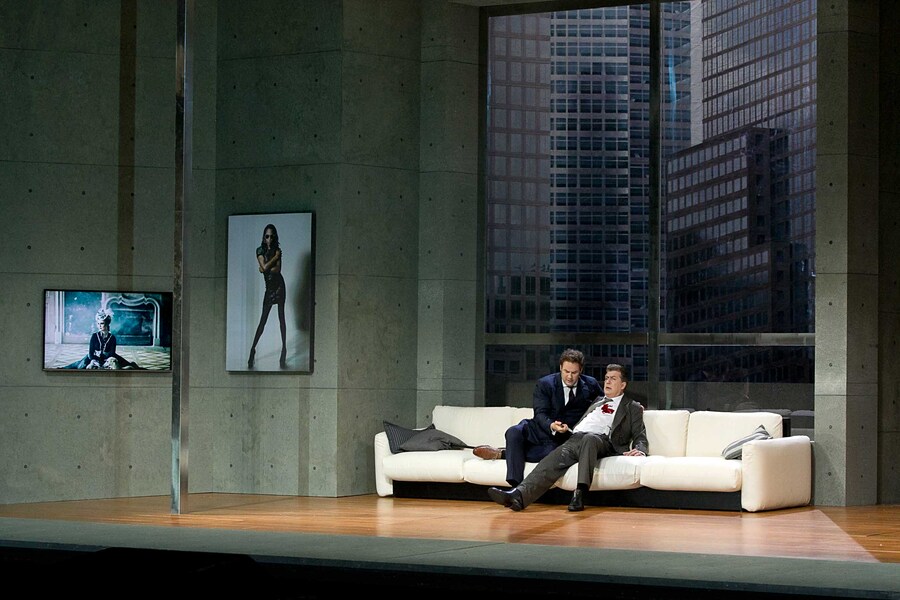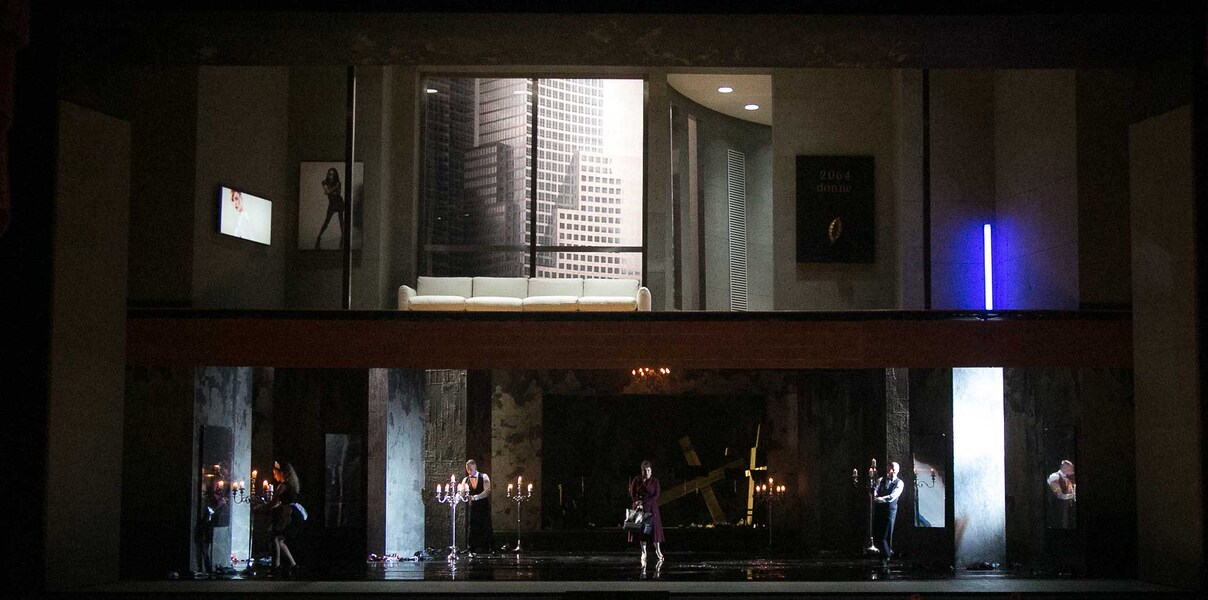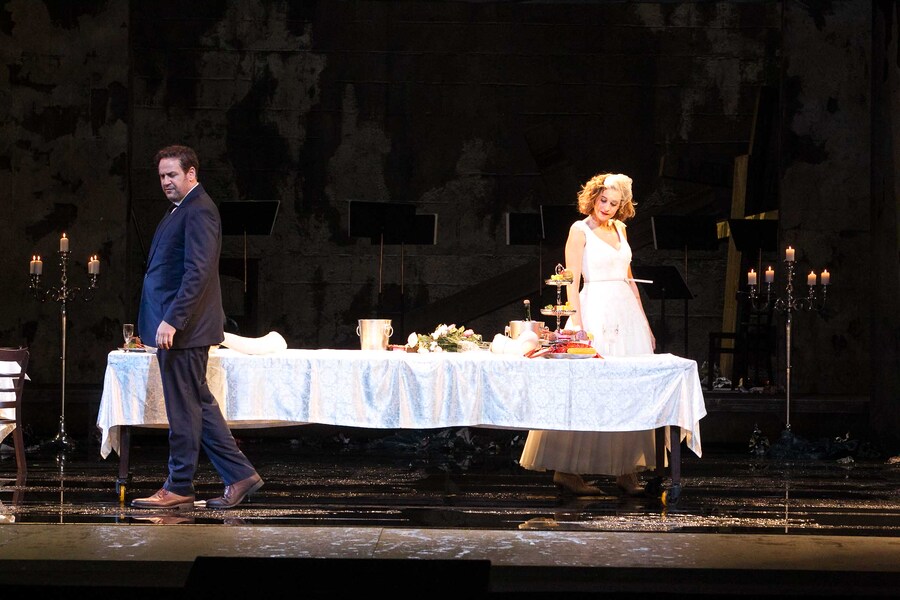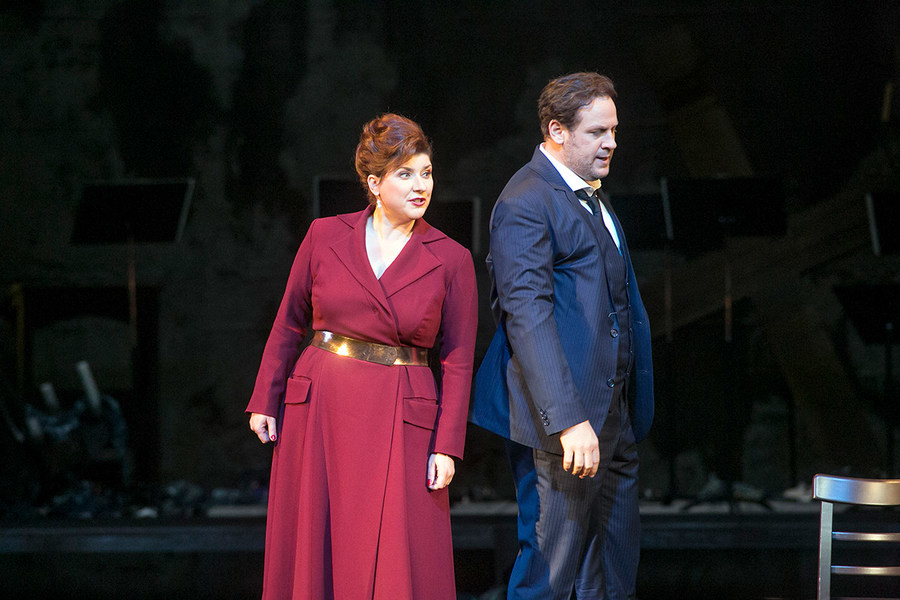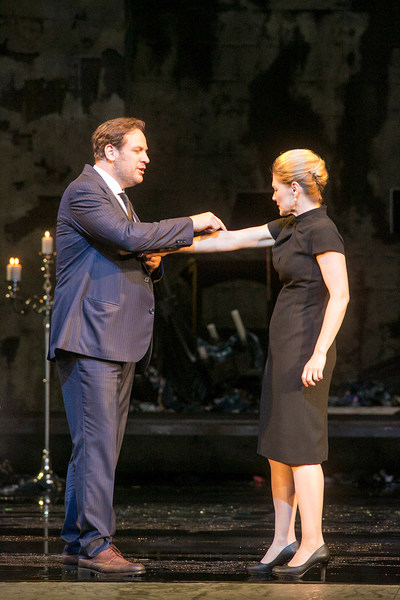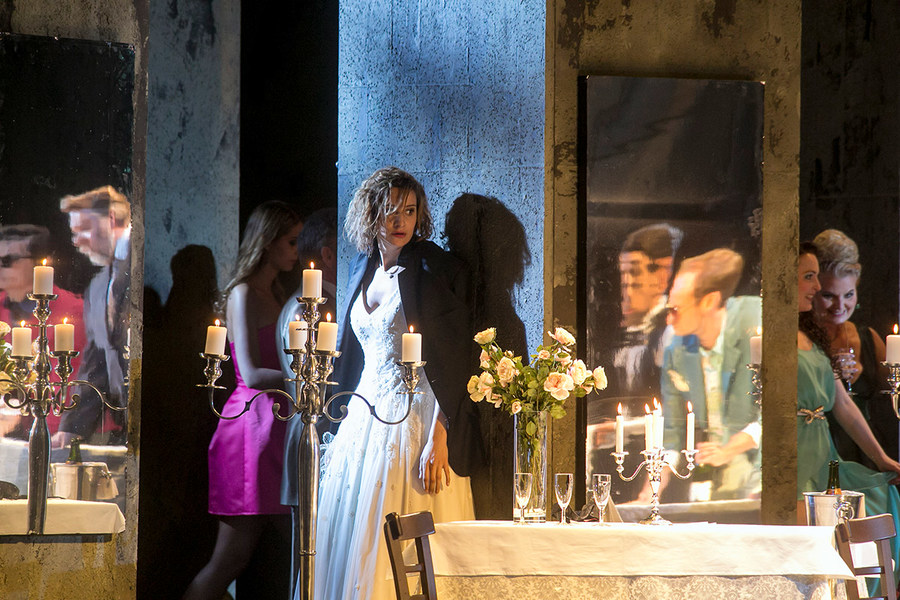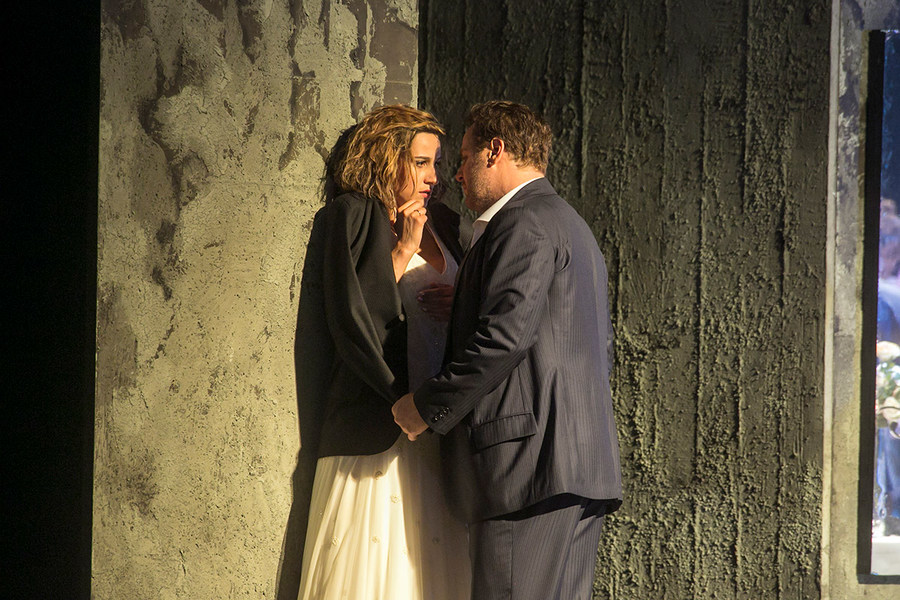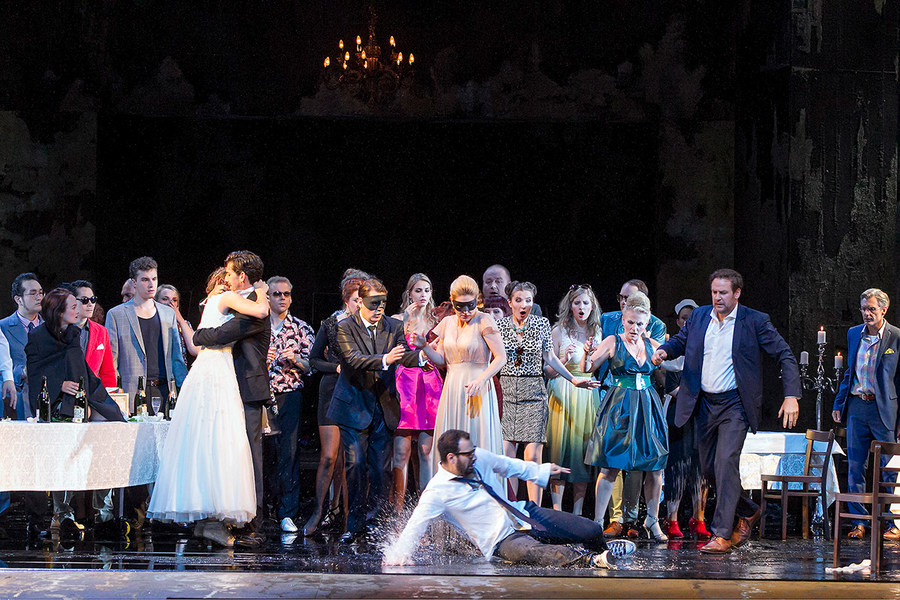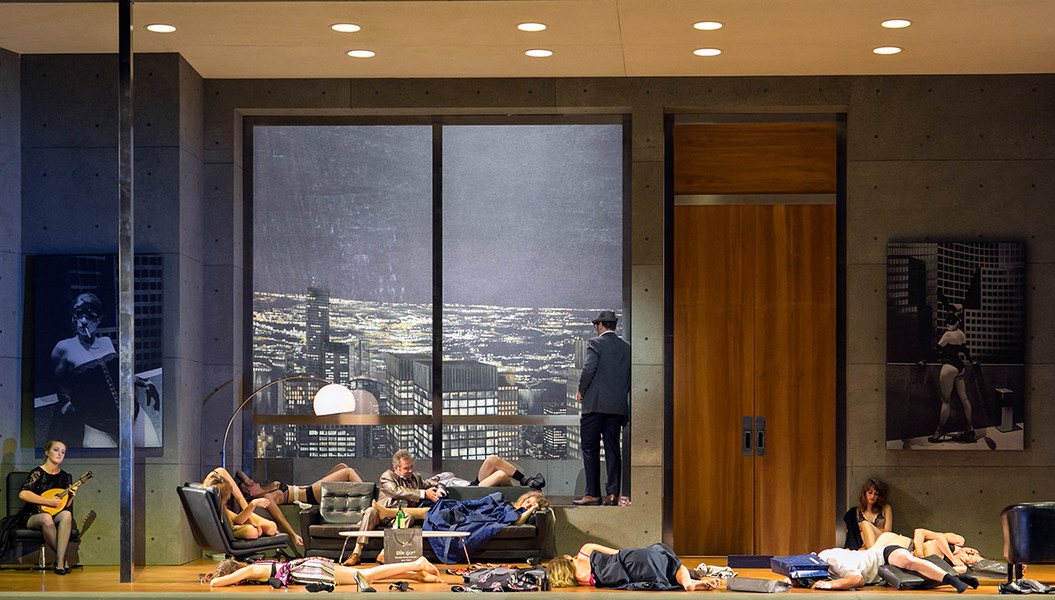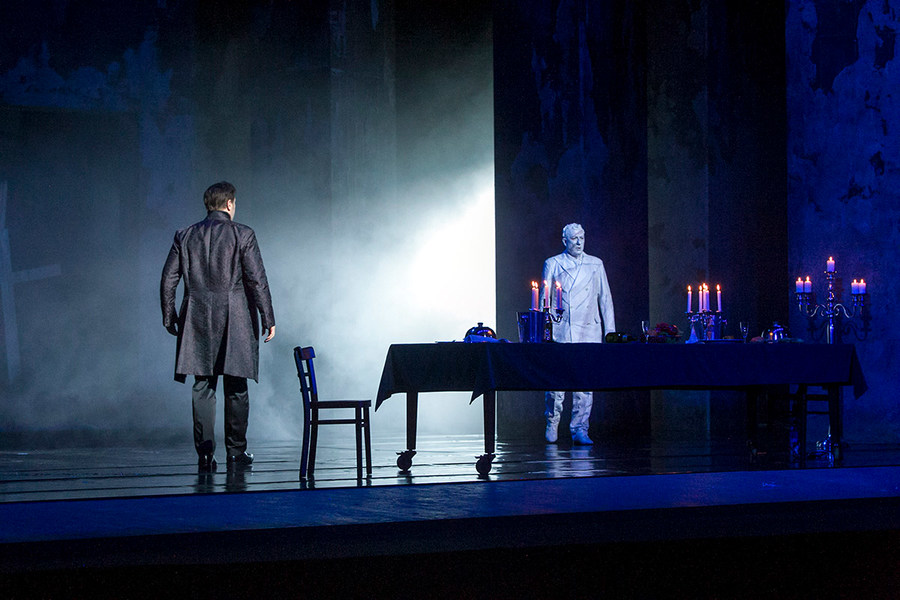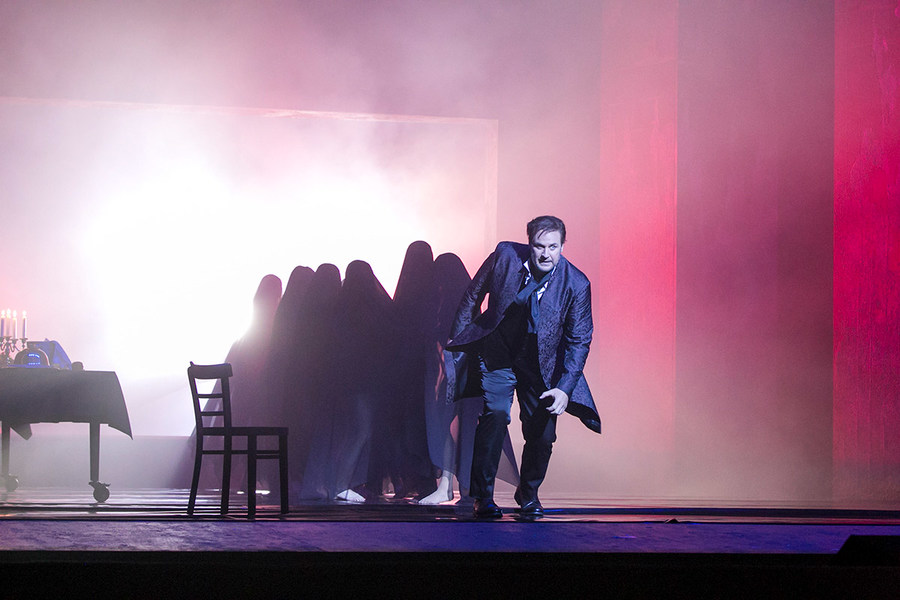The unscrupulous seducer Don Giovanni believes he can get away with anything – until the past comes knocking for revenge...
Dramma giocoso in two acts
Libretto by Lorenzo da Ponte
Performed in Italian with German and English surtitles
Premiere
12. June 2016
Dates & Cast
- Conductor Giulio Cilona
- Staging Andreas Kriegenburg
- Set Design Harald Thor
- Costume Design Tanja Hofmann
- Lighting Design Stefan Bolliger
- Choir Bobin Kim
- Dramaturgy Anne Gerber
- Don Giovanni Lucas Meachem
- Il Commendatore Tilmann Rönnebeck
- Donna Anna Martina Russomanno
- Don Ottavio James Ley
- Donna Elvira Tara Erraught
- Leporello Neven Crnić
- Masetto Vladyslav Buialskyi
- Zerlina Valerie Eickhoff
- Conductor Giulio Cilona
- Staging Andreas Kriegenburg
- Set Design Harald Thor
- Costume Design Tanja Hofmann
- Lighting Design Stefan Bolliger
- Choir Bobin Kim
- Dramaturgy Anne Gerber
Sächsische Staatskapelle Dresden
Generously supported by the Stiftung Semperoper – Förderstiftung
- Don Giovanni Lucas Meachem
- Il Commendatore Tilmann Rönnebeck
- Donna Anna Martina Russomanno
- Don Ottavio James Ley
- Donna Elvira Tara Erraught
- Leporello Neven Crnić
- Masetto Vladyslav Buialskyi
- Zerlina Valerie Eickhoff
- Conductor Giulio Cilona
- Staging Andreas Kriegenburg
- Set Design Harald Thor
- Costume Design Tanja Hofmann
- Lighting Design Stefan Bolliger
- Choir Bobin Kim
- Dramaturgy Anne Gerber
Sächsische Staatskapelle Dresden
Generously supported by the Stiftung Semperoper – Förderstiftung
- Don Giovanni Lucas Meachem
- Il Commendatore Tilmann Rönnebeck
- Donna Anna Martina Russomanno
- Don Ottavio James Ley
- Donna Elvira Tara Erraught
- Leporello Neven Crnić
- Masetto Vladyslav Buialskyi
- Zerlina Valerie Eickhoff
- Conductor Giulio Cilona
- Staging Andreas Kriegenburg
- Set Design Harald Thor
- Costume Design Tanja Hofmann
- Lighting Design Stefan Bolliger
- Choir Bobin Kim
- Dramaturgy Anne Gerber
Sächsische Staatskapelle Dresden
Generously supported by the Stiftung Semperoper – Förderstiftung
- Don Giovanni Lucas Meachem
- Il Commendatore Tilmann Rönnebeck
- Donna Anna Martina Russomanno
- Don Ottavio James Ley
- Donna Elvira Tara Erraught
- Leporello Neven Crnić
- Masetto Vladyslav Buialskyi
- Zerlina Valerie Eickhoff
- Conductor Giulio Cilona
- Staging Andreas Kriegenburg
- Set Design Harald Thor
- Costume Design Tanja Hofmann
- Lighting Design Stefan Bolliger
- Choir Bobin Kim
- Dramaturgy Anne Gerber
Sächsische Staatskapelle Dresden
Generously supported by the Stiftung Semperoper – Förderstiftung
- Don Giovanni Lucas Meachem
- Il Commendatore Tilmann Rönnebeck
- Donna Anna Martina Russomanno
- Don Ottavio James Ley
- Donna Elvira Tara Erraught
- Leporello Neven Crnić
- Masetto Vladyslav Buialskyi
- Zerlina Valerie Eickhoff
In brief
According to his servant Leporello, Don Giovanni has already loved no fewer than 2,064 women; the number of those he has left with broken hearts cannot be any less. This masterpiece about the charming yet unscrupulous lothario Don Giovanni became (in the words of Richard Wagner) the „opera of all operas“, thanks to the inspired collaboration of Wolfgang Amadeus Mozart and his librettist Lorenzo Da Ponte. The work, which premiered in Prague in 1787, is more than just a tale of love and seduction, lust and immorality, rape, murder and revenge. Expressly called a „funny drama“ by Mozart, the narrative alternates between tragedy and comedy, between tales of sex-and-crime and theatrum mundi. Don Giovanni, with his passion for breaking rules and taboos, does not shy away from challenging the Dead and even Fate itself. In his staging for Dresden, Andreas Kriegenburg highlights the contemporary relevance of the characters’ endless greed for life, love and beauty.
Storyline
First act
Leporello is railing against his lot working for Don Giovanni: he would much rather be in the position of the rich man about town himself, instead of covering his back for various love affairs. Don Giovanni storms in, trying to hide from Donna Anna, who is pursuing him in a mad rage. Donna Anna’s father, the Commander, tries to apprehend Don Giovanni and is killed by him in the heat of the moment. Donna Anna returns to the scene of the murder with Don Ottavio. She makes her friend swear vengeance for her father over the dead body. Unimpressed by Leporello’s reproaches for his moral conduct after the deed, Don Giovanni is still on the lookout for more women. He espies a promising conquest in a lady who has been jilted by her lover. But as he tries to comfort her in his usual manner, it dawns upon him who she is: Donna Elvira, whom he himself had abandoned after a passionate three-day romance. Giovanni leaves the piquant situation to Leporello, who presents an aghast Elvira with his considerable list conscientiously recording all of Giovanni’s love affairs: the latest tally is 2064 names. This leaves Elvira thirsting for revenge. At the same time, Zerlina and Masetto are exuberantly celebrating their wedding. Don Giovanni invites the party to his home and sends them there to be alone with Zerlina. Just as his assurances are about to make her yield, Donna Elvira enters and denounces Giovanni as a traitor. Elvira also intervenes when Donna Anna and Don Ottavio visit Giovanni to ask for his help. Her suspicions aroused, Donna Anna recognizes Giovanni as her assailant and her father’s murderer. She angrily tells Don Ottavio about the rape in the night of the murder. Giovanni and Leporello are getting everything ready for a boisterous celebration. Zerlina is meanwhile trying to calm down the jealous Masetto. Donna Anna, Donna Elvira and Don Ottavio also come to the dance. When Giovanni ultimately besieges Zerlina, they unmask the rapist, who manages a narrow escape.
Second act
Leporello threatens to leave Giovanni, but the latter appeases him and lets him in on his next plan: he wants to swap clothes and seduce Donna Elvira’s maid while Leporello diverts Donna Elvira by posing as a rueful Don Giovanni. The ruse appears to work: Donna Elvira is responding to the supposed Giovanni’s vows to be faithful, while the real Giovanni serenades his latest love interest. This is interrupted by Masetto, who wants to find and kill Don Giovanni. Giovanni, pretending to be Leporello, offers his help at first, but then brutally strikes down Masetto. Zerlina finds Masetto and consoles him with a very special ‘medicine’. In his attempt to escape from Donna Elvira, Leporello runs into Donna Anna, Don Ottavio, Zerlina and Masetto, who mistake him for Giovanni and want to slay him. He unmasks himself and gets away. Don Ottavio, who had doubted Giovanni’s guilt so far, now announces his intention to report him to the authorities. Leporello has meanwhile fallen into Zerlina’s hands, who threatens him with great relish. Donna Elvira, the only one to have asked for Giovanni’s life to be spared, vents her conflicting emotions: even though he has hurt her so much, she still worries about him. Giovanni is meanwhile enjoying the night and relating another escapade to a much worse-for-wear Leporello. A sudden otherworldly voice interrupts them: the statue of the murdered commander warns Giovanni that his laughter will not last. Amused, Giovanni invites the statue for dinner. To alleviate her suffering, Don Ottavio proposes to Donna Anna, but she puts him off because of her mourning. Don Ottavio proclaims to stand by her nonetheless. The banquet is prepared at Giovanni’s when Donna Elvira implores him to change his ways for the very last time. Yet Don Giovanni will have none of it. Then the statue of the commander appears and asks Giovanni to repent. He refuses and is carried down to hell.
Explore
Don Giovanni
